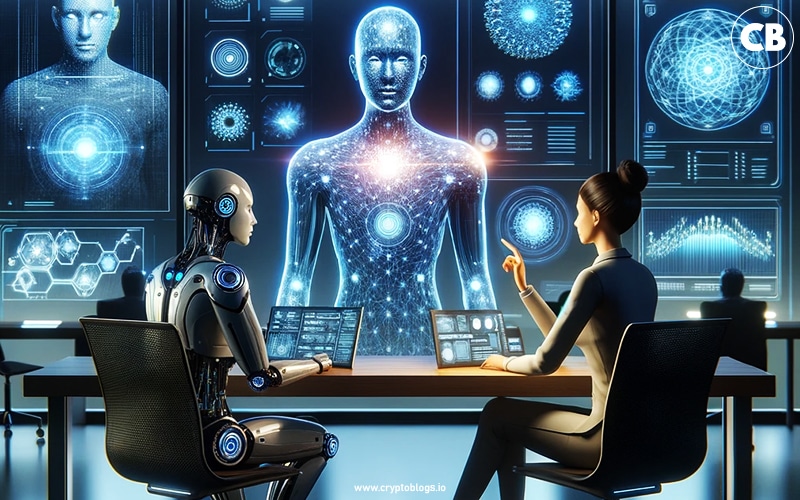Artificial Intelligence (AI) is currently the hottest topic in the area of technology and innovations. It’s said that the next decade will be AI-centric, and everything will be heavily dependent on artificially curated human-like response programs.
This buzz around AI has also coincided with AGI, which is an advanced and more sophisticated intelligence program. AGI is slowly making its way toward the world of technology and engineering despite most people not being aware of AI’s existence.
This article will throw light on the complex and futuristic subject of AGI and how it will make changes to our world. Let’s get into it;
What is Artificial General Intelligence (AGI)?
Artificial General Intelligence (AGI) is intelligent machine programs that can learn, think, and perform intellectual tasks. AGI could behave like a human mind and solve problems by mimicking human actions.
Also referred to as strong AI or deep AI, AGI can comprehend and process information provided as input and make decisions. It is a sub-category of Artificial Intelligence that works on the concept of Mind AI Framework. While most AI applications execute general tasks, AGI could perform human-like cognitive functions such as learning new concepts and making decisions using common sense.
AGI is currently in theoretical form, and it has been researched and developed by several entities. At its full potential, AGI would be capable of solving various complex problems in different domains.
Concept of Artificial General Intelligence
As AGI is in the theoretical form, the actual concept may differ from all the studies. There are also debates on different approaches to how it would be created. Several researchers claim that the novel method of developing such an application could be based on deep learning and neural networks. Other methods include the study of the human brain and neuroscience technology to create a human-like artificial consciousness.
In a research paper, Ben Goertzel – a popular AI researcher – states,”General intelligence involves the ability to achieve a variety of goals, and carry out a variety of tasks, in a variety of different contexts and environments.”
According to Goertzel, “a generally intelligent system should be able to handle problems and situations quite different from those anticipated by its creators,” and it “should be good at generalizing the knowledge it’s gained, to transfer this knowledge from one problem or context to others.”
AI Vs AGI
Artificial intelligence (AI) is currently used in a vast majority of applications, where it processes predefined tasks such as designing images or creating content based on the prompts. AGI, on the other hand, would be developed with intelligence of its own.
The main difference between both is the fundamentals, where existing AI is categorized as narrow or weak. AGI, on the other hand, is aligned with general intelligence, which can be described as a superior concept.
AGI is the more advanced version of AI, which is only a theoretical concept with no solid applications or prototypes. The existing applications of AI are generalized for automotive tasks, whereas the applicability of AGI would be much broader in large-scale sectors across a variety of industries.
While AI focuses on providing output for specific problems, AGI will embrace a self-learning and problem-solving technique for producing output.
The self-improving nature of AGI could open up many benefits in a variety of sectors. However, it also poses severe risks of being misused or – the most feared – becoming uncontrollable by humans.
Risks of Artificial General Intelligence
Below are some risks associated with the AGI;
- Threat to Human Existence
- The most significant risk associated with AGI is its self-learning characteristic, which could lead it to gain unnecessary and excessive amounts of knowledge. As shown in Sci-fi movies once these machines obtain certain information, their existence becomes a threat to humanity. Although this scenario is beyond imagination now as per the current development stage, it is still considerable as a major risk to human society.
- Employment Risks
- Another risk of AGI is its industrial use which is tied to the replacement of human workers. While advanced machinery and automation have already snatched basic jobs from people, the onboarding of AGI will be a bloodbath for the socio-economy.
- Cyber Security
- A human-like thought processing of AGI would disrupt existing resources for its benefit. AGI would have the capacity to breach, hack, or control the data available on the internet which has become an important factor in this tech-friendly age. The superintelligence of AGI might be misused to modify or alter data sources on a large scale.
Benefits of Artificial General Intelligence
Besides all these negative aspects, AGI could bring substantial benefits to humankind ranging from simple chores to performing surgeries in the medical field. The potential benefits of AGI are listed below;
- Exceeding Capabilities
The most probable benefit of AGI is its capacity to discover things beyond the human mind. An AGI would have the ability to solve problems using its high computational power where human finds a limit. For instance, finding the most accurate cure for cancer, fixing economic problems on a global scale, etc.
- Performing Complex & Subtle Tasks
As said above the AGI could perform surgeries and even make intellectual decisions required for complex tasks. It will be able to add accountability in specified operations rather than just following instructions and producing results.
- Automation
While automation using AGI is considered a risk, it is also a benefit if it is used precisely. The use of AGI in industrial applications could save time, reduce operating costs as well as remove the danger to human lives.
Future of Artificial General Intelligence
The final implementation of AGI is still a dystopian dream, even for AI researchers. Several scientists and tech entrepreneurs believe that the initial setup of AGI will be prepared within the next decade.
As AI applications, such as ChatGPT and Google Gemini, are already creating robust changes in the current world, the introduction of AGI would open up a new window in every aspect. The ability to think, understand, and make decisions like a human being in AGI will lead to a significant transformation of every specific task.
Most of the AGI applications would be initially developed for specific problems in the fields of medicine, automotive, or, most favorably, the technology industry. AGI enables automating any task that requires critical decision-making power. The prime examples would be driving vehicles, performing medical surgeries, industrial designing, and more.
One of the most anticipated and futuristic uses of AGI is in the robotic field, like all those robots shown in movies like Terminator, Blade Runner 2049, I Robot, etc. This is likely to occur in everyone’s mind when talking about the future of AI. However, such a robot has yet to become a reality, and it may take more than a decade. Although there are close developments like Sofia the Robot, but it is still at a level where the implementation of AGI has just begun.
Conclusion
While the world is still learning to use AI tools like ChatGPT, the concept of AGI is far away from the general public. The applications of AI are rapidly growing even for general purposes like designing, writing, or producing content. There is a mass push towards AI with the countries like UAE also being supportive of this new-age technology. With this growing AI adoption, people’s expectations for further development in the AI field are increasing. In a short time, we might see evolutionary AI developments and it will potentially be led by AGI.
Also Read: The Role of AI to Identify Sustainable Crypto Breakouts
FAQs
What is AGI in Artificial Intelligence (AI)?
AGI stands for Artificial General Intelligence which is a theoretical concept of advanced AI. While AI can produce output for specific tasks, AGI can think like humans and make intellectual decisions.
Will AGI replace humans?
The actual use of AGI is years away as it is only a theoretical concept currently, so thinking about AGI replacing humans does nowhere seem to be true.
Can AI think like humans?
The current applications of AI could not think like humans but the concept of AGI makes us believe that AI will be able to think like humans in the future.
Can artificial intelligence (AI) replace human intelligence?
As of now, artificial intelligence is not capable enough to replace human intelligence. However, Artificial General Intelligence (AGI) is the closest theoretical concept that could come near to human intelligence.







